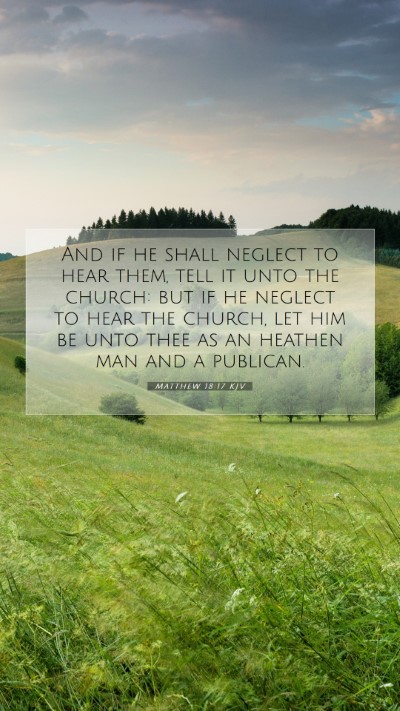Understanding Matthew 18:17
Matthew 18:17 states: "And if he shall neglect to hear them, tell it unto the church: but if he neglect to hear the church, let him be unto thee as an heathen man and a publican." This verse is a significant element of the teachings of Jesus, providing insight into conflict resolution and community accountability within the Christian faith.
Bible Verse Meanings
This passage addresses the steps to take when a brother or sister in faith sins against another. The first step is a private conversation aimed at reconciliation. Should that fail, the next step involves bringing a couple of witnesses to affirm the matter. If the individual still refuses to listen, the issue is brought before the church community.
Commentary Insights
- Matthew Henry: Henry emphasizes the importance of church discipline, indicating that this process is not merely punishment but a means to restore the sinner. The intent is always to guide the erring member back to a right relationship with God and fellow believers.
- Albert Barnes: Barnes notes that disregarding the church’s authority is seen as a serious matter that separates an individual from the community of faith. He discusses the cultural implications, where 'heathen' and 'publican' denote those outside the faith and thus unclean or impure.
- Adam Clarke: Clarke elaborates on the implications of treating someone as a heathen or a publican, suggesting a method of exclusion that serves to highlight severity of indifference to God's laws, and aims to encourage repentance.
Biblical Exegesis
The historical context of Matthew 18 reveals that Jesus was addressing His disciples, teaching them about humility, forgiveness, and the collective responsibility of the church. This teaching aligns with the larger themes found throughout the Gospel of Matthew, emphasizing the Kingdom of God and the importance of community.
Application of Matthew 18:17 in Daily Life
Applying this verse requires a balance of love and discipline. In a church setting, it highlights the importance of maintaining unity and accountability. Private matters should remain private as the first course of action, and when necessary, communal guidance should be sought.
Related Bible Cross References
- Galatians 6:1: "Brethren, if a man be overtaken in a fault, ye which are spiritual, restore such an one in the spirit of meekness; considering thyself, lest thou also be tempted." - This emphasizes the spirit of restoration.
- Luke 17:3: "Take heed to yourselves: If thy brother trespass against thee, rebuke him; and if he repent, forgive him." - It reflects the process of confrontation and forgiveness.
- 1 Corinthians 5:12-13: "For what have I to do to judge them also that are without? do not ye judge them that are within? But them that are without God judgeth. Therefore put away from among yourselves that wicked person." - This shows the authority of the church to judge its members.
Conclusion
In conclusion, Matthew 18:17 serves as a crucial guideline for conflict resolution within the church, calling for a compassionate yet firm approach to sin and a dedication to restoring relationships. Understanding this verse in conjunction with the insights found in public domain commentaries can deepen one's Bible study experience, offering tools for comprehensive learning.


